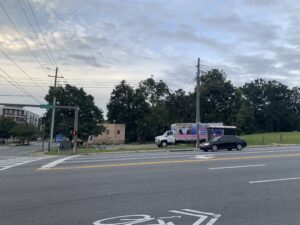
The process of improving a building or an area with the intent of moving low-income people out — in hopes that middle-class citizens will move in — is called gentrification.
And make no mistake, gentrification is happening in Frenchtown, where a mostly Black district is being impacted the most.
Frenchtown is located between downtown to the south and Midtown to the east, with Macomb Street serving as its primary commercial hub.
With the development of new apartment complexes and advanced beautification, families who’ve lived there for years are being pushed out to more “affordable” living situations.
Richard Dusembury, who has been in Frenchtown since 2006, said: “There’s not enough affordable housing anywhere,” regarding the neighborhood.
Frenchtown has been a historically black area since 1825. Freed African Americans ended up there after the Civil War a d there have been Black families there even to this day.
Most residents in this area are not opposed to beautifying their neighborhood. iI fact, many said they truly do wish to improve the place. The only issue with renovating is the fact that the prices of living will increase along with the goods and services in the surrounding area.
“It’s [gentrification] taking away from the history of our neighborhood,” said Dorothy Brown, a Frenchtown native.
On the cusp of Frenchtown, across the street from Popeyes Chicken at the corner of Macomb and West Tennessee streets, lies an empty lot, the site of the former homeless shelter that was demolished In 2017.
The destruction of this building that was once home for many homeless people has forced some of the people who resided there to live on the streets. Now, three years later, there are still homeless people who linger in that area.
The increase in gentrification in Frenchtown has caused the homeless numbers to spike, not only causing economic complications, but also health troubles as well. According to homewardboundwnc.org, “They [homeless people] lack access to health care and often have chronic illnesses, made worse by tough living conditions: sleeping outside in all weather, eating cheap starchy foods, and being in close quarters at social service agencies with other unhealthy people.”
Some have argued that improving the community through gentrifying historically Black areas is a positive thing because it increases property value to benefit homeowners. However, the people who are being affected the most are the ones who’ve lived in Frenchtown for years.